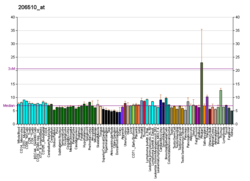SIX2
Appearance
(Redirected from SIX2 (gene))
Homeobox protein SIX2 is a protein that in humans is encoded by the SIX2 gene.[5][6]
References
[edit]- ^ a b c GRCh38: Ensembl release 89: ENSG00000170577 – Ensembl, May 2017
- ^ a b c GRCm38: Ensembl release 89: ENSMUSG00000024134 – Ensembl, May 2017
- ^ "Human PubMed Reference:". National Center for Biotechnology Information, U.S. National Library of Medicine.
- ^ "Mouse PubMed Reference:". National Center for Biotechnology Information, U.S. National Library of Medicine.
- ^ "Entrez Gene: SIX2 sine oculis homeobox homolog 2 (Drosophila)".
- ^ Oliver, Guillermo (1995). "Homeobox genes and connective tissue patterning" (PDF). Development. 121 (3): 693–705. doi:10.1242/dev.121.3.693. hdl:11858/00-001M-0000-0013-037D-E. PMID 7720577.
Further reading
[edit]- Strausberg RL, Feingold EA, Grouse LH, et al. (2003). "Generation and initial analysis of more than 15,000 full-length human and mouse cDNA sequences". Proc. Natl. Acad. Sci. U.S.A. 99 (26): 16899–903. Bibcode:2002PNAS...9916899M. doi:10.1073/pnas.242603899. PMC 139241. PMID 12477932.
- López-Ríos J, Tessmar K, Loosli F, et al. (2003). "Six3 and Six6 activity is modulated by members of the groucho family". Development. 130 (1): 185–95. doi:10.1242/dev.00185. PMID 12441302.
- Ikeda K, Watanabe Y, Ohto H, Kawakami K (2002). "Molecular interaction and synergistic activation of a promoter by Six, Eya, and Dach proteins mediated through CREB binding protein". Mol. Cell. Biol. 22 (19): 6759–66. doi:10.1128/MCB.22.19.6759-6766.2002. PMC 134036. PMID 12215533.
- Buller C, Xu X, Marquis V, et al. (2002). "Molecular effects of Eya1 domain mutations causing organ defects in BOR syndrome". Hum. Mol. Genet. 10 (24): 2775–81. doi:10.1093/hmg/10.24.2775. PMID 11734542.
- Boucher CA, Winchester CL, Hamilton GM, et al. (2000). "Structure, mapping and expression of the human gene encoding the homeodomain protein, SIX2". Gene. 247 (1–2): 145–51. doi:10.1016/S0378-1119(00)00105-0. PMID 10773454.
- Celli J, van Beusekom E, Hennekam RC, et al. (2000). "Familial syndromic esophageal atresia maps to 2p23-p24". Am. J. Hum. Genet. 66 (2): 436–44. doi:10.1086/302779. PMC 1288096. PMID 10677303.
- Kawakami K, Ohto H, Takizawa T, Saito T (1996). "Identification and expression of six family genes in mouse retina". FEBS Lett. 393 (2–3): 259–63. Bibcode:1996FEBSL.393..259K. doi:10.1016/0014-5793(96)00899-X. PMID 8814301. S2CID 20829948.






